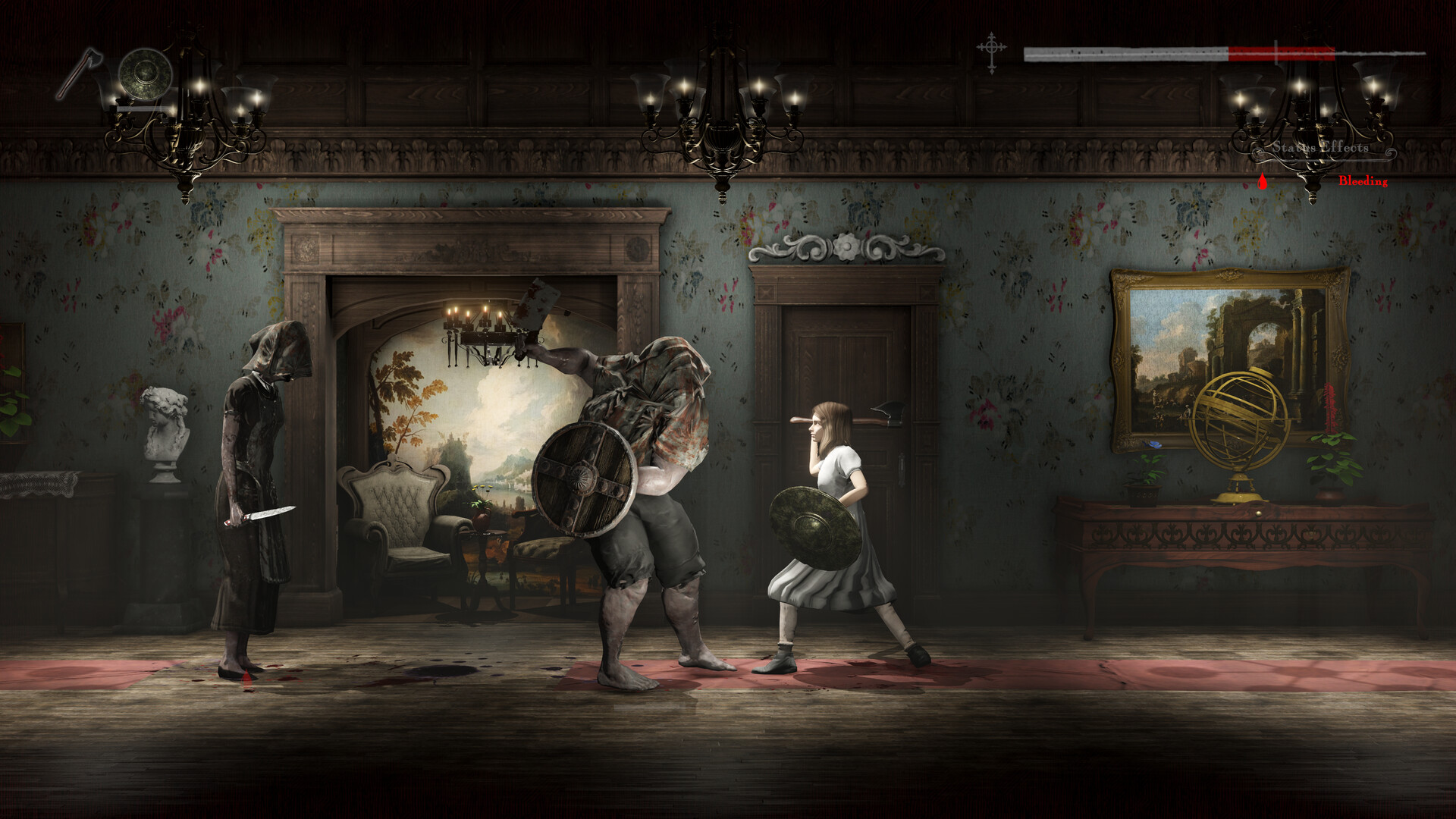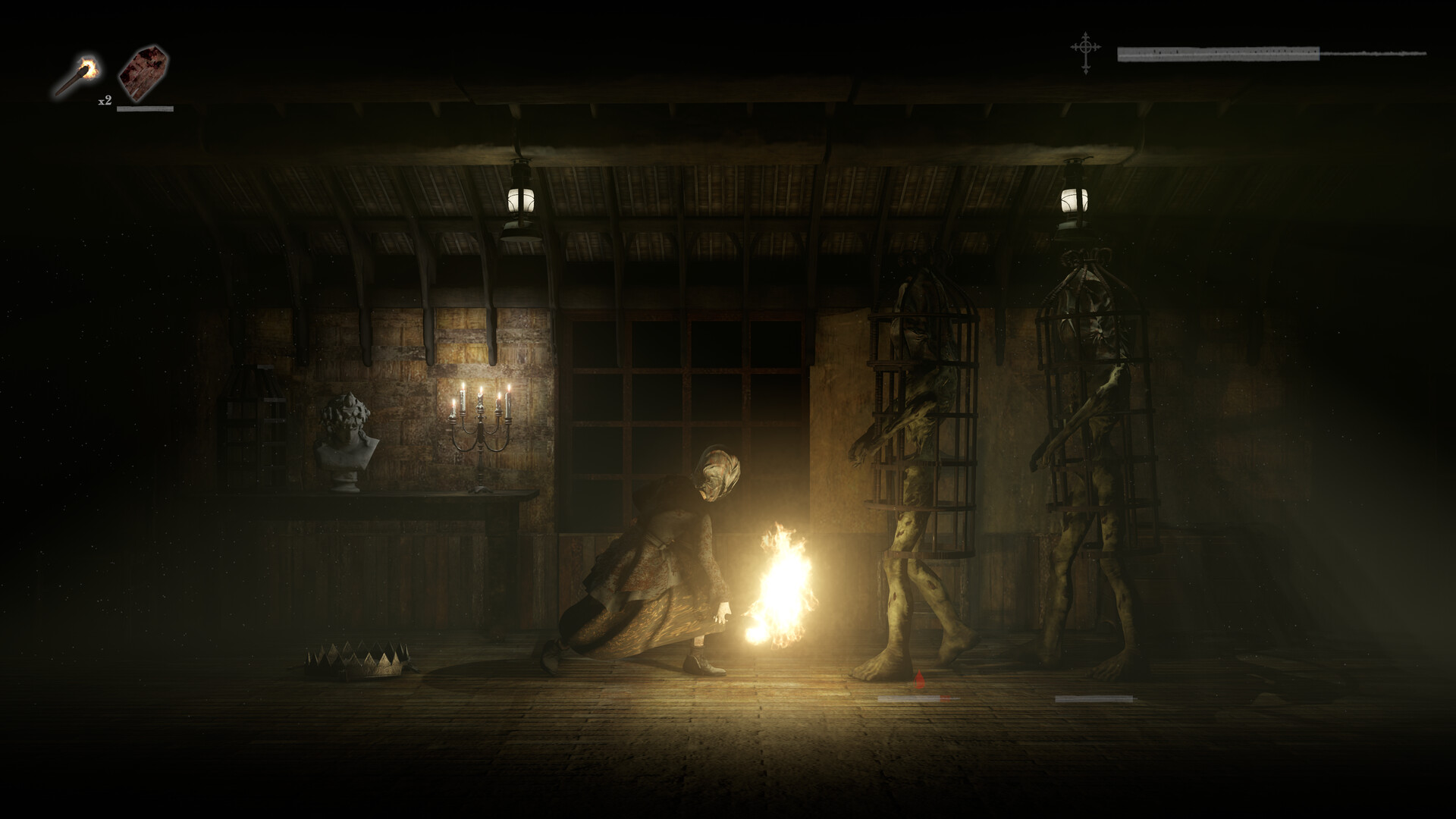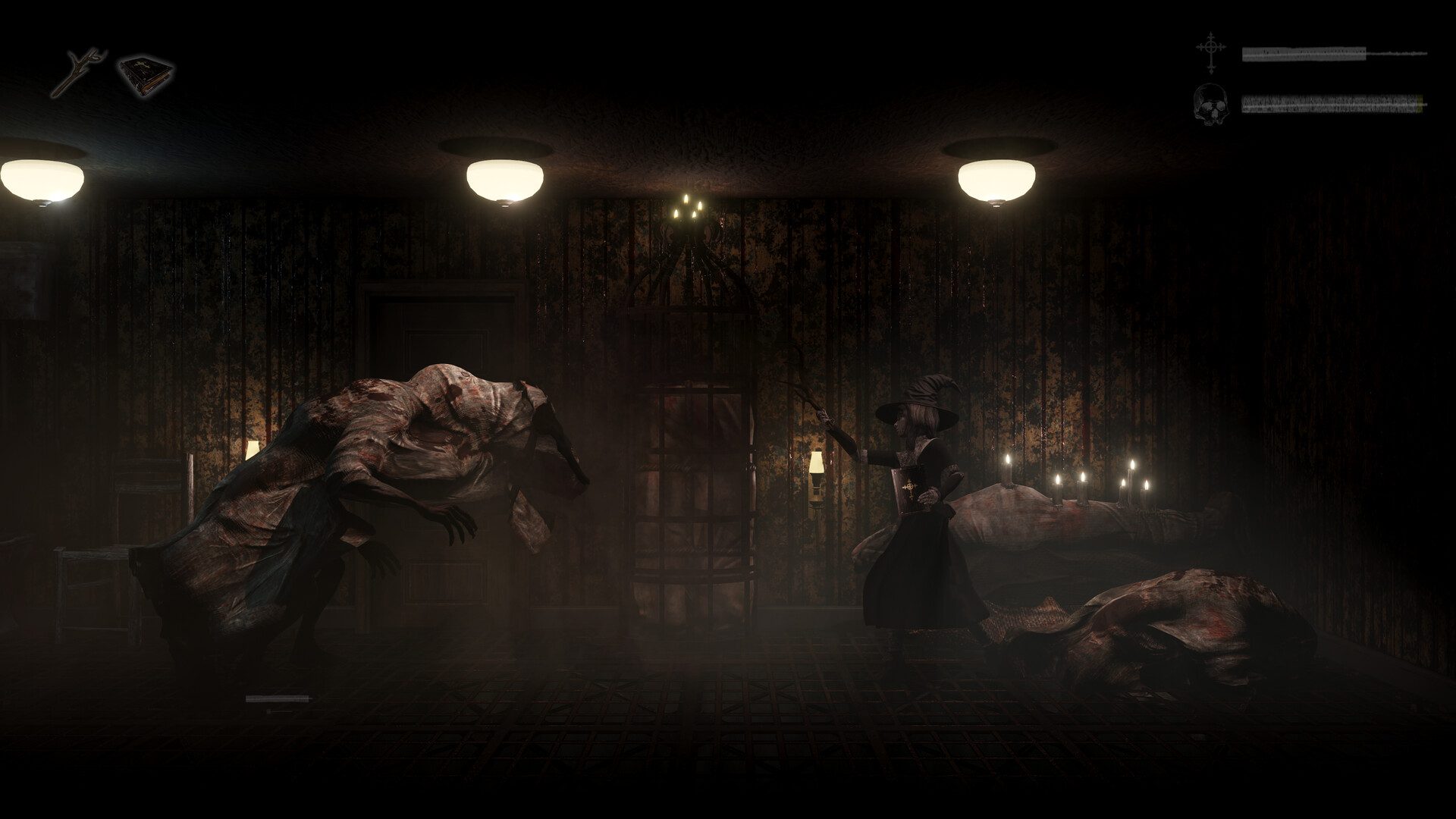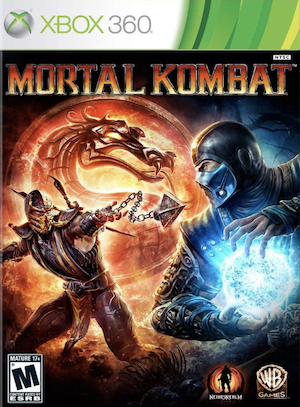
Withering Rooms has been in early access for about a year and a half now, and though it’s flown under the radar for many, it’s received high praise from those who have been playing it, and looking at it, it’s easy to understand the appeal. Combining survival horror with Soulslike action, RPG progression, and roguelike design in a sidescrolling experience, it’s certainly delivering something that feels very unique. Soon, the game will be hitting a major milestone with its full 1.0 release on April 2, and ahead of that occasion, we recently had the chance to send across some of our questions about the game and what its upcoming update will bring to the table, among other things. Below, you can read our interview with Withering Room’s solo developer Troy West.
"That core idea has remained the same, but feedback from alpha and Early Access has definitely shaped the game into something different (and better!) than I originally envisioned."
On their own, RPGs, roguelites, horror games, and sidescrollers might not necessarily seem unique, but a game that combines elements of all four certainly does. How did that concept first come about, and how much did it change over the course of development?
I’ve always loved survival horror games set in mansions – Resident Evil 1, Clocktower, Haunting Ground, etc.
I’ve also been a Soulslike fan since Demon’s Souls back in 2009. Playing through Boletaria 1-1 for the first time is something I’ll never forget. Creeping through with my shield up, looking in every corner for something that might kill me, it really felt like a survival horror game.
However, once you’ve memorized the layout of the mansion or level, the experience is never the same because you know what’s coming. That realization was the genesis of Withering Rooms – what about a survival horror game set in a mansion that changes each night so you can hold on to that feeling of not knowing exactly what monster or what treasure is behind each door?
That core idea has remained the same, but feedback from alpha and Early Access has definitely shaped the game into something different (and better!) than I originally envisioned.
Withering Rooms’ procedurally generated Victorian setting is one of its more intriguing elements, especially because procedural generation isn’t something that we see too often in horror games in particular. How does the game use this design to its benefit, and how does it impact the replay value?
When you first play a section of a survival horror or Soulslike game, you are paying close attention and really living in the moment because you don’t know what’s waiting ahead. Subsequent playthroughs are about mastery, which is also fun but clearly a different mindset – that monster is going to jump out of here so I’m ready for it, the next section I’ll do with ranged attacks so I can lure them out one by one, etc.
My hope is that Withering Rooms provides a blend of those two experiences. Particularly in later levels and New Game +, as the amount of randomness and player freedom ramps up, it’s great to enter a room and come face to face with a different set of enemies and challenges each night. It’s a big sanity bonus for me to still have that element of surprise when I’m play-testing an area for the thousandth time.
Having spent roughly a year and a half in early access, what are the biggest ways that Withering Rooms has been able to benefit from feedback from the community?
When the game first launched, the focus was much more on projectile and spellcasting builds. In fact, melee weapons only had a single attack each, and were designed as something to fall back on when you were out of jars, bullets and spells. It was obvious early on that many players were naturally leaning into melee, so the melee combat system was completely revised to have combos, heavy attacks, etc. as well as expanding the set of melee weapons considerably so it could be a true third pillar for builds.
Originally there were only a few outfits, and each outfit was a complete head to toe costume. Outfits were surprisingly popular, so I wound up splitting the head and body outfits and adding many more outfits with each update. There’s now close to a thousand combinations.
While the game launched playable start to finish, I knew I was going to be adding more content. The major areas of the game that were added during Early Access – the Cholera Clinic, Central Station, Bog, Cagewood and Blackett House – were chosen directly to answer some of the questions the community had about the backstory.
New Game + was added during Early Access, and was originally somewhat limited in scope. I was surprised when I saw just how many players were engaging with it, which made me want to expand on it significantly, including another ending.
Finally, as a solo developer, the Early Access community was critical for bringing up the quality of the game by finding bugs and balance issues that there are simply not enough hours in the day for me to find myself.
I’m incredibly grateful to everybody who took the time to play the game and give feedback or bug reports during Early Access. If anybody who plays the game today went back and tried the Early Access launch day build, they would be shocked.
"As a solo developer, the Early Access community was critical for bringing up the quality of the game by finding bugs and balance issues that there are simply not enough hours in the day for me to find myself."
How much will players’ actions impact the way the story plays out? How radically do the game’s multiple endings differ from each other?
There are four endings to the game, one of which is only accessible from New Game +. The endings are all completely different and they are only impacted by quests and choices you make towards the end of the game. It’s hard to explain without spoilers, but each ending represents a completely different fate for the game world and whether a given ending is “good” or “bad” is in the eye of the beholder. It’s been very gratifying to see community members give very different interpretations on which is the “good” ending.
Will New Game Plus mode bring any exclusive new content or challenges for players to tackle?
The New Game + mode is very robust – there’s new monsters, a new boss, new NPCs, and more. There’s also the novelty of playing the earlier chapters with more radically randomized monster layouts and all of your powerful weapons from the end of New Game. You can also keep playing past New Game +, a few Early Access players have played through over 30 times with their character, which is astounding to me.
Roughly how long will an average playthrough of Withering Rooms be?
Based on recent Early Access data, if you play on Standard difficulty, you can expect anywhere from 15-35 hours for New Game depending on what bosses give you trouble and how thorough you are with optional content (of which there is a lot). Achieving the final ending in New Game + and beyond varies widely – from 40 to 100+ hours.
Can you tell us what the status of Withering Rooms’ Steam Deck verification is?
Withering Rooms has full Steam Deck support, performs well and has been played start to finish by many players in Early Access on Steam Deck. Just waiting on Valve to get through their (presumably giant) queue of games to test so it can get officially verified.
Do you have any plans for bringing the game to the Switch or last-gen consoles at some point down the line?
As a solo developer starting out in the middle of the current generation, I faced some logistical issues getting the necessary approvals and development kits for last-gen and Switch. If the game sells well and there’s an audience I’d love to expand the game’s reach, but at this moment there are no plans.
"Starting out in the middle of the current generation, I faced some logistical issues getting the necessary approvals and development kits for last-gen and Switch. If the game sells well and there’s an audience I’d love to expand the game’s reach, but at this moment there are no plans."
Given that you have now worked on all the current gen consoles, have you noticed any differences working on Xbox Series X/S and PS5, especially with the marginal differences they do have in their hardware?
The short answer is no, but given the technical nature of the questions I can expand a bit on why.
Since Withering Rooms is heavily inspired by the stylized realism of PS2 horror classics like Silent Hill 2, Rule of Rose, or Haunting Ground, the raw geometry and texture detail don’t pose a problem for either machine.
However, because the game is procedurally generated it cannot rely on any pre-baked lighting. Most of the lighting in the game is from gas or candle sources, with subtle position and intensity variation over time. The player and their companions/familiars can add 6+ additional dynamic lights into the scene depending on what is equipped. That means there are a lot of full or nearly full screen dynamic lights with shadows and volumetrics drawn every frame.
So while the game is light on the CPU, and can’t really take full advantage of the SSD since it’s not streaming any giant baked lightmaps, textures, or large scale geometry, it does put an unexpected amount of pressure on the GPU (at least for a stylized indie title) when running at high quality settings.
Despite the difference in raw GPU specs, by the time I had put in the work to reach the game’s frame rate and resolution target on both platforms the performance was virtually identical. Both platforms have great toolchains that make it easy to spot problems. If I wasn’t a solo developer with the rest of the game to worry about, it’d be fun to spend time implementing features like ray-traced AO(or a time sliced AO pre-bake when a room is being instantiated before you enter) that might better demonstrate some differences between the platforms. But overall I’m very satisfied with the presentation on both machines right now.
The Xbox Series S features lesser hardware compared to Xbox Series and Microsoft is pushing it as a 1440p/60 FPS console. Do you think it will be able to hold up for the more graphically intensive games as this generation progresses?
After getting Withering Rooms to 4k/60fps on the Series X, I found that the Series S comfortably achieved the 1440p/60fps target and required no special effort on my part. This is the case I believe the Series S was designed around (half the resolution requires a quarter the GPU power).
However, many games are now targeting far below 4k on the Series X which makes the S a trickier proposition. Given the majority of Xbox players are on the S, I think it makes financial sense to invest in making S a great experience even if it’s not equivalent.
What frame rate and resolution will the game target on the PS5 and Xbox Series X/S?
The game targets 4k at 60fps on PS5/Xbox Series X, and 1440p at 60fps on Xbox Series S. It uses dynamic resolution scaling in some cases to maintain 60fps but usually runs at the full resolution target.



















Share Your Thoughts Below (Always follow our comments policy!)